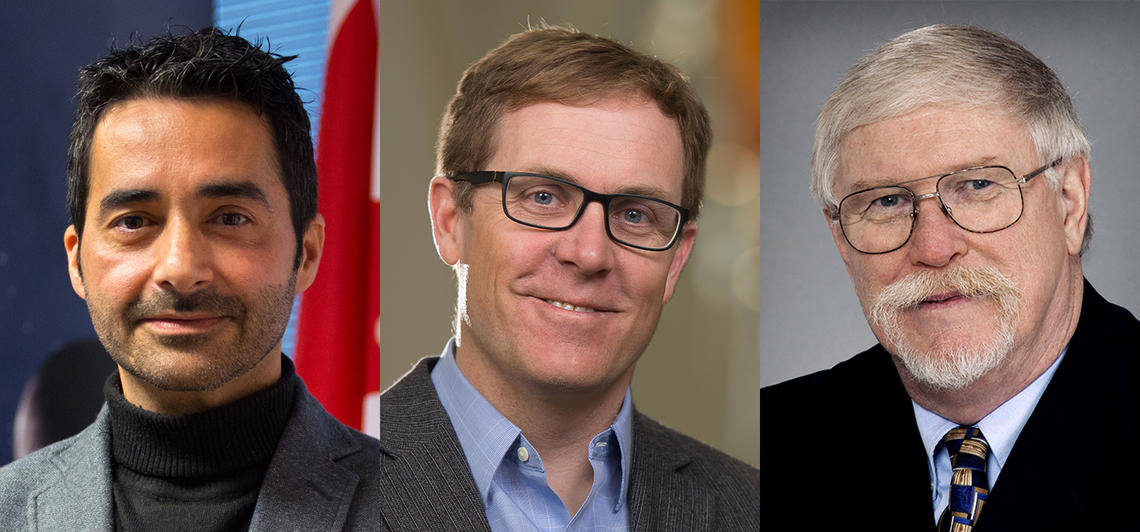
From left: Giuseppe Iaria, Steven Boyd, and David Hart.
March 9, 2021

The University of Calgary has emerged as a leading force in national space health research with the formation of the Canadian Space Health Research Network (CSHRNet), an initiative established thanks in a large part to a generous donation from an anonymous Calgarian.
The newly formed network’s advisory board includes UCalgary’s Dr. Giuseppe Iaria, a cognitive neuroscientist with the Faculty of Arts, Dr. David Hart with the Faculty of Kinesiology and Cumming School of Medicine (CSM), and Dr. Steven Boyd with the Faculty of Kinesiology, the Schulich School of Engineering and the CSM. Also on the advisory board are researchers from the University of British Columbia, the University of Waterloo, the University of Toronto, the Université de Montréal, the University of Ottawa, and York University.

From left: Giuseppe Iaria, Steven Boyd, and David Hart.
“It’s a community we would like to grow,” says Iaria. “We’re looking forward to having additional members whose health research could also be applied to space health.”
The newly formed CSHRNet defines space health as a multidisciplinary field that encompasses science, technology, engineering, arts, and math for the purpose of enabling the physical, mental and social well-being of humans in their ability to survive and thrive in outer space.
Iaria adds that space health research frequently translates into benefits for all Canadians. “In my specific project funded by the Canadian Space Agency, for example, I study the neurological effects of spaceflight on the spatial orientation skills of astronauts,” he says. “This has the potential to benefit all Canadians who face spatial orientation challenges due to vestibular disorders that have symptoms similar to the ones experienced in microgravity by astronauts.
In the context of mental health, imagine the benefits of investigating team dynamics in extreme stressful environments, such as the ones in which astronauts live and work during their spaceflight missions. And, of course, technological advancements are of crucial importance, as is the case of MRI scanners largely advanced by efforts made in image processing technology by the space health industry.
Iaria and his CSHRNet colleagues are grateful for the generous donation which allowed them to create the network and they’re actively seeking further funding opportunities. “We’re looking for other philanthropists,” he says. “Passionate individuals who believe in our mission and are willing to donate to the advancement of space health research in Canada for the benefit of all Canadians.”
An important objective of the CSHRNet is to promote collaboration within the field of space health research, support trainees, and connect the research community more effectively with the Canadian Space Agency. “The Canadian Space Agency is already very well connected with the research community, of course, but the connection is usually through individual universities,” Iaria explains. “This initiative will pull space health researchers and trainees together in a more cohesive way, allowing them to share data and creating a network that is far greater than the sum of its parts.”
The CSHRNet has currently received financial support from the Department of Psychology and the McCaig Institute for Bone and Joint Health. Additional funding is critical for promoting important collaborative research projects and supporting trainees and postdocs in their space health career, for which the network is already organizing a national research symposium to be held in Calgary in the fall of 2021.
Help advance Canadian Space Health Research for the benefit of all Canadians by making a gift here today. Or, you can make your impact this April for Giving Day. Donate here starting April 1 to have your gift matched dollar-for-dollar up to $2,500. Give early — matching funds are limited! Learn more on how you can double your impact by contacting Concetta Sonnenberg at 403-612-0289 or concetta.sonnenberg@ucalgary.ca.
Giuseppe Iaria is a professor of cognitive neuroscience in the Department of Psychology in the Faculty of Arts, an adjunct professor in the Department of Clinical Neurosciences at the Cumming School of Medicine (CSM) and a member of the Hotchkiss Brain Institute and the Alberta Children’s Hospital Research Institute at the CSM.
Steven Boyd is a professor at the CSM in the Department of Radiology at the University of Calgary, and holds a joint position at the Schulich School of Engineering and the Faculty of Kinesiology. He is the Bob and Nola Rintoul Chair in Bone and Joint Research and the McCaig Chair in Bone and Joint Health. He is also the director of the McCaig Institute for Bone and Joint Health at the CSM.
David Hart is a professor at the CSM in the Department of Surgery, an adjunct professor in the Faculty of Kinesiology and the Centre for Hip Heath and Mobility at the University of British Columbia, and a member of the McCaig Institute for Bone and Joint Health and the Snyder Institute for Chronic Diseases at the CSM.